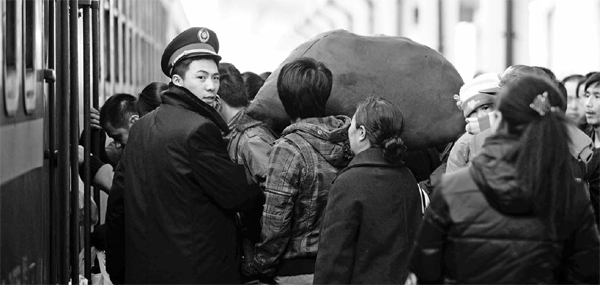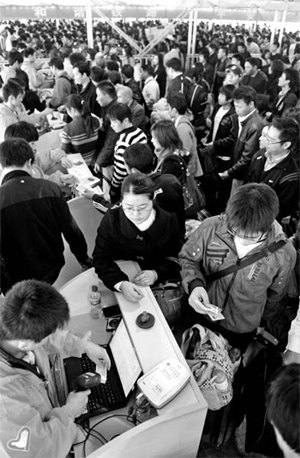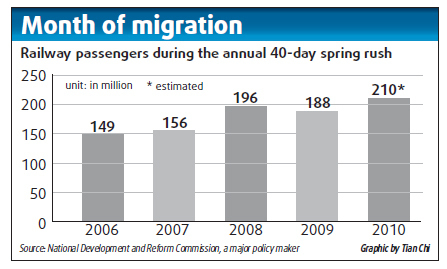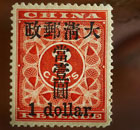Society
Scalpers laugh off the new train ticketing system
By Huang Zhiling in Chengdu, Qiu Quanlin in Guangzhou, Peng Yining and Wang Shanshan in Beijing (China Daily)
Updated: 2010-02-01 06:40
 |
Large Medium Small |
|
 More than 70,000 passengers passed through the platforms of Harbin Railway Station, Heilongjiang province, on Saturday, the fi rst day of the annual ‘spring rush’, a peak travel time. [Photo/Wang Jianwei] |
Confident scalpers laugh off predictions that the new train ticketing system will wipe out 'yellow bulls.' Huang Zhiling in Chengdu, Qiu Quanlin in Guangzhou, Peng Yining and Wang Shanshan in Beijing report
As the man strolled beside the long lines outside Beijing Railway Station, occasionally stopping to chat with random strangers, the casual observer would be forgiven for thinking he was just another migrant worker, or even a beggar asking for spare change. Few would immediately recognize this man in a scruffy blue jacket and worn trousers as a ticket scalper.
"I know someone who works for the railway station, so you don't have to line up," whispered the man to a China Daily reporter posing as a potential customer.
He led our reporter to the front of a queue and murmured something to the official ticket seller through the glass. After a moment he turned and announced he could get a ticket immediately - but it would cost the reporter extra.
"If you want to queue, go ahead; but you will never get the ticket," said the scalper, who refused to give his name. "At the end of the day, you'll come to me anyway."
|
 Thousands of travelers gather at Guangzhou Railway Station on Saturday. The station is one of 37 across three provinces piloting a new system that requires people to give their names and identity numbers when booking tickets. [Photo/Lu Hanxin] |
Being a huang niu - or yellow bull, so called because of the immense power they wield - is a lucrative career in China. Ticket scalping generates about 1.8 billion yuan ($260 million) every Spring Festival, according to government statistics. To slay these "bulls", however, the State is piloting a new system that requires passengers to give their names and identity numbers when booking tickets.
The system has been running at 37 stations across Sichuan, Guangdong and Hunan provinces since
Jan 21, but not in Beijing. The plan is designed to prevent scalpers from buying large amounts of tickets during the "spring rush" - the peak time for ticket sales in China - and selling them on for higher prices, which puts extra pressure on Spring Festival travelers.
About 210 million people are expected to travel by train during this year's 40-day spring rush, which started last Saturday, according to figures released by the National Development and Reform Commission, a major policymaker.
One migrant worker trying to secure passage to his hometown for Spring Festival is Yu Xin, 28. He was sat on four large woven bags in the large open square outside Beijing Railway Station while his friend waited in line to buy tickets to Qiqihar in the far northeastern Heilongjiang province.
"I used to work in Shenzhen (in Guangdong) but I changed to Beijing last year because it became too difficult to get tickets back home in time for Chinese New Year," he said as he shivered against the strong, icy wind. "I always had to transfer in Beijing and each time had to sleep several nights outside the station because it took so long to get a ticket. It is a painful experience but I must go home. It's the only time of year I can get together with my family."
The migrant worker said he loathed scalpers and hoped the new system will drive them away. "Their tickets are too expensive, and we cannot get tickets because they buy them all," he said angrily.
One scalper approached by China Daily in Beijing laughed when asked about the new ticketing system. "The government is bluffing," he said. "They are just trying to make us panic, but I know the system is not going to happen nationwide. You cannot imagine how many people are making money from the current system."
Scalpers have good reason to be bold. At the main station in Chengdu, capital of Sichuan, on Jan 14, huang niu could be easily spotted bargaining with potential customers in loud voices despite being surrounded by at least 50 patrolling police officers and 20 chengguan, urban management officers.
"We only make sure that the station is clean and not too crowded," said a chengguan surnamed Huang who has worked at the station for more than five years.

A police officer stood close to several scalpers said: "We policemen only take care of things that are our duty."
Scalpers in Guangzhou, capital of Guangdong, were also unfazed by the introduction of the new booking system. A man surnamed Li operating in the city's main station - one of those piloting the new system - offered to buy tickets for a China Daily reporter from a friend working at an official sales point.
"My friend sells tickets in a booth at the station. You can use your own ID card and have your name on the tickets. There is nothing to worry about," said Li, who advertises his services and publishes his contact information on local Internet forums.
A man surnamed He who wanted to travel from Guangzhou to Chengdu on Feb 8 said he was approached by six scalpers at the station. Each offered to use his ID card information to buy him a ticket in exchange for between 130 to 200 yuan. "One told me that because I wanted to travel at the peak time there was no way I'd be able to get a ticket by queuing at one of the official booths," he said.
Under the pilot scheme, customers must call a booking hotline with their identity card information before being given a confirmation number to show at an official ticket booth.
However, in an article published in Guangzhou-based Yangcheng Evening News on Jan 25, a reporter described how he bought a new identity-tagged ticket from a scalper. The reporter rang the hotline and was told the tickets he wanted were sold out. Yet when he handed over his identity card information to a scalper in Guangzhou Railway Station he was immediately given a confirmation number to buy tickets for the day and destination he desired.







